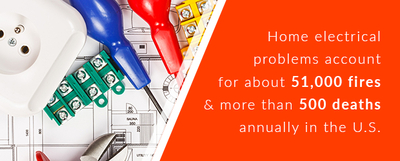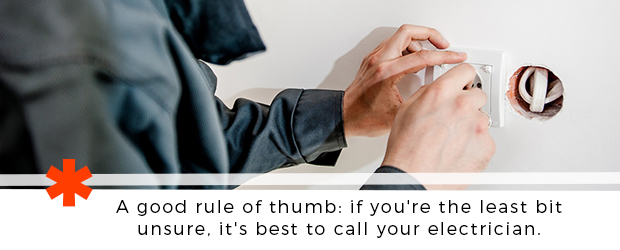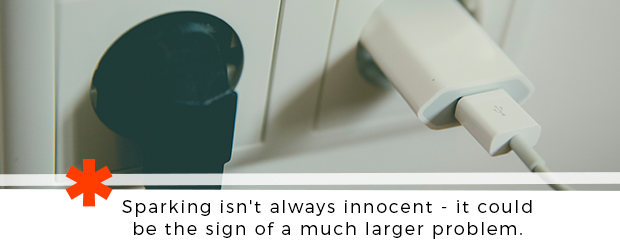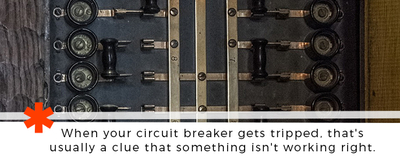How to Solve Common Household Electrical Problems

Nobody likes to deal with electrical problems in their home. They’re a nuisance and they can be dangerous. Home electrical problems accounted for about 51,000 fires and more than 500 deaths annually in the U.S. according to the Electrical Safety Foundation International.
But why all these fires? Why so much damage?
It could be because many of us simply don’t take the time to understand our houses and our electrical systems, and common electrical issues go unnoticed. You might be walking past serious electrical concerns without a second thought — just because you don’t even recognize they’re there.
Table of Contents
- Flickering Lights
- Bulbs Burning Out Too Fast
- Recessed Ceiling Light Losing Power
- Outlets Sparking
- Outlet Doesn’t Work
- Breaker Keeps Tripping
- Frayed Wires
You’re probably perfectly capable of replacing a light bulb, or flipping a switch on your breaker. But most experts agree that when it comes to handling serious electrical problems in your house, it’s best to step back and let the professionals handle things. Attempting to repair some common household electrical problems without contacting a professional could result in serious injury and/or damage.
Not sure if the electrical problem is something you can fix or something that requires an expert’s attention? A good rule of thumb is that if you’re the least bit unsure, it’s best to call your electrician. It’s better to be safe than sorry — and avoid potentially causing more damage.
Still, that doesn’t mean you should sit on the sidelines while you wait for the electrician to get there. By arming yourself with knowledge, maybe you can help by diagnosing or isolating the electrical problem before the professionals even arrive.
If you’re experiencing electrical problems at home, do a little detective work and try to figure out what’s causing them. Here are a few of the most common household electrical problems, and what you can do to diagnose them.
1. Flickering Lights
Does your light bulb flicker, growing suddenly dimmer, and then suddenly brighter? Does a light flicker even when turned off? If so, you’re not alone. Flickering lights are one of the most common household electrical problems.
First, check the basics. Make sure the bulb is screwed in tightly. Try switching your bulb out for a different one, in case the problem is with the bulb itself. Confirm you’re using the recommended wattage. Your problem could be that simple.
If none of these seem to be the culprit, the most likely cause is a poor connection. Your best course of action is to call a professional to fix this problem right away before it becomes a broken connection.
You can help diagnose the problem by seeing if the circuit breaker keeps tripping in one room, or if it’s happening throughout the house. This can help determine if the flickering lights are on one circuit, or if more circuits are affected.

2. Light Bulbs Burning Out Too Fast
This is another common electrical problem that could have a couple of causes. The good news is that all of them are relatively simple, and have quick, easy fixes.
- You might be running a bulb with too high wattage.
- You might be leaving the bulb on too long.
- You might be using a cheap, poor bulb.
Always make sure you are using the correct bulb for the socket, and you are not leaving them on for extremely long periods of time.
Another possible explanation is the quality of power your bulb is receiving. Most power companies deliver more than the 120 volts that the average bulb is intended for. Because they’re receiving too much power, they can tend to have shorter lives.
A solution to this problem is to buy the same bulb as before, but to look for the one stamped “130v” instead of “120v.” The downside of this solution is that the light won’t be quite as bright from this new bulb, but it should last longer.
3. Recessed Ceiling Light Losing Power, but Then Working Later On
This is actually a safety feature, rather than an electrical problem. Most likely, you’re using a bulb with too high a wattage. The bulb is getting too hot, so it powers itself off. When it’s had time to cool down, it turns itself back on.
This one is an easy fix. Simply replace the bulb with one of a lower wattage.
4. Electrical Outlets Sparking
Electrical outlets sparking doesn’t always mean there’s a problem. Electrical outlets are known to spark sometimes, especially if you’ve just plugged in a large appliance. It’s similar to static electricity, and is entirely normal.
Sparking isn’t always innocent, of course. It could also be the sign of a much larger problem. It could mean that the outlet gets too hot, and the heat has stripped away the protective coating of the wires. This means that the sparking is being caused by the electricity jumping through these bare wires. This could lead to a dangerous electrical fire.
If the sparking only seems to happen when you’ve turned on a large appliance, you’re probably safe. But if it seems to be happening for no reason, you might want to contact an electrician and let them look at the outlet.

5. Electrical Outlet Doesn’t Work
First, determine if multiple electrical outlets don’t work, or if it’s just one. If none of your outlets work, consider checking with your neighbors to see if they are having the same problem. If they are, the problem is with your power company. Give them a call as soon as possible.
If just one outlet has no power, then you have a case of a dead outlet. You’ll want to locate your main circuit breaker. In most houses, they’re in the basement, garage, laundry room, or maybe a utility closet.
Once you’ve located your circuit breaker, you’re going to determine if the electrical problem was caused by the breaker being tripped. One way to do this is to see if any of the switches are in the “off” position. Another way is to switch them all off, and then switch them on one by one to figure out what controls what. Of course, this is a great thing to know even if there is no emergency.
One way to do this is to use the buddy system. One of you can flip the breaker switches while the other one watches or tests to see which breaker seems to be controlling which outlets and switches. This will save you from having to run back and forth.
Okay, so you’ve checked your breaker, and it wasn’t tripped. But your outlet still has no power. What else could be the problem?
Check the outlet itself. Is it stained black or brown? If so, this could mean that your outlet has burned out. If this is the case, do not touch it. Even if half the outlet still seems to be working, do not use it. Call an electrical professional immediately to get the outlet replaced.
Did your electrical outlets stop working suddenly? This could have been to protect you. Some outlets are built with a failsafe feature. This means that if they sense a problem that could be harmful to either you or to itself, the outlet shuts itself off automatically.
These outlets are called ground-fault circuit interrupter (GFCI). They’re usually located in places like your kitchen, bathroom, laundry room, garage or outdoors. They might shut themselves off if they experience a harmful surge of electricity, or if they encountered moisture.
You can determine if you have a GFCI outlet by looking to see if it has two little buttons in the middle of the outlet. One should say “test” and another should say “reset.” If the “reset” button has been pushed out, simply press it back in to reset the outlet. They can also be reset on your main circuit breaker.
None of these solutions seem to be working? It might be time to call an electrician.
If you do decide to call in an electrician, take note of which outlets aren’t working. Is it the electrical outlets in one entire room that seem to not be working? Is it just the outlets on one wall that aren’t working? This might be an indication that the problem is part of one single circuit. This is helpful information that you can share with your electrician.
6. Breaker Keeps Tripping
Is your breaker constantly tripping and you can’t figure out why? There could be a couple of different reasons. Here are a few of the ways you can find out what is tripping your circuit breaker.
First, it’s important to realize that your circuit breaker is a safety device. Its job is to prevent fires and keep you and your house safe. When your circuit breaker gets tripped, that’s usually a clue that something isn’t working right. Of course, the breaker could be faulty, but it’s best to assume there’s a real problem and to check for it.
- GFCI Outlets: One cause for a tripped circuit breaker might be those GFCI outlets again. If you reset your circuit breaker and the circuit breaker keeps tripping immediately afterward, it could be trying to warn you that there is something bigger going on under the surface. They are shutting themselves off to protect you from whatever the problem is. Contact your electrician immediately.
- Circuit is Overloaded: Another issue might be that the circuit breaker is just overloaded. If you’re running multiple high-wattage appliances on the same circuit, it could be overloading and tripping. To fix this, you can either switch certain items to a different outlet or a different room. Another solution is to ask your electrical professional to set up a separate circuit for the appliances causing the problem. It also helps to turn off appliances when you’re not using them.
- Short Circuit: Another problem could be something called a short circuit. This means that the electrical current is traveling down a different path than it’s supposed to. For example, in most regular appliances, the electrical current flows in through one wire, and out through another. But if one wire is broken, the path is interrupted and the electricity travels down a different path. This could cause the wires to get hot and possibly start a fire. This is another problem to contact your electrician about.
- Weather: Another possible explanation might be the weather. Does your breaker keep tripping after every storm? If so, water might be coming into contact with your electrical system. Anytime water and electricity are mixing, this is a highly dangerous situation. It’s very important not to attempt to fix this problem yourself. Call in a professional and explain the problem.
- Power Surge: Your breaker also could be tripping because of a power surge. Even though you might think of power surges as something that happens because of a lightning strike, they’re a lot more common than that. It might be caused by the power company making changes to their grid or even just by powering off a large appliance.

Power surges can be extremely damaging to your electronics. Your breaker is tripping to protect them. You can take steps to keep your electrical equipment safe by purchasing and installing surge protectors and similar items.
Does your circuit breaker keep tripping even with nothing plugged in or without load? Or none of these issues seem to be causing the problem? There are probably some internal issues with the wiring. Call an expert and ask them if they can diagnose the problem.
As tempting as it can be to simply flip the switch to reset the breaker, it’s important to remember that the breaker is usually tripping for a reason. It’s trying to keep you safe. It’s worth taking the time to try to figure out the source of the problem. You never know what problems you might be ignoring if you don’t. It’s always best to be on the safe side.
7. Frayed Wires
This is a problem that often gets overlooked. Using electronics with frayed wires is practically an invitation for electrical fires and other disasters. Faulty wires should always be replaced.
Signals that a wire needs to be replaced include exposed wiring, fraying, black or brown stains or a nasty, burning smell. If you notice any of these problems with any of your wires, don’t ignore them. Just buy a new wire and hire an electrician to install it for you.

You’ve Diagnosed the Problem. Now What?
After you’ve diagnosed the probable cause of your electrical problem, it’s important to take the next step. Avoid attempting to do complicated electrical repairs on your own. This is dangerous both for you and your electrical system.
It can be tempting to think that your problem isn’t a big deal. But why take that risk? Your home and safety are too important.
Instead, call the team of knowledgeable and reliable professionals at Lippolis Electric. Your home is too valuable to risk by underestimating the issues that could be going on in your house.
Schedule service
Please note that your appointment is not set until confirmed by Lippolis Electric shortly after you've submitted the form.
| ‹ | › | |||||
| Sun | Mon | Tue | Wed | Thu | Fri | Sat |

